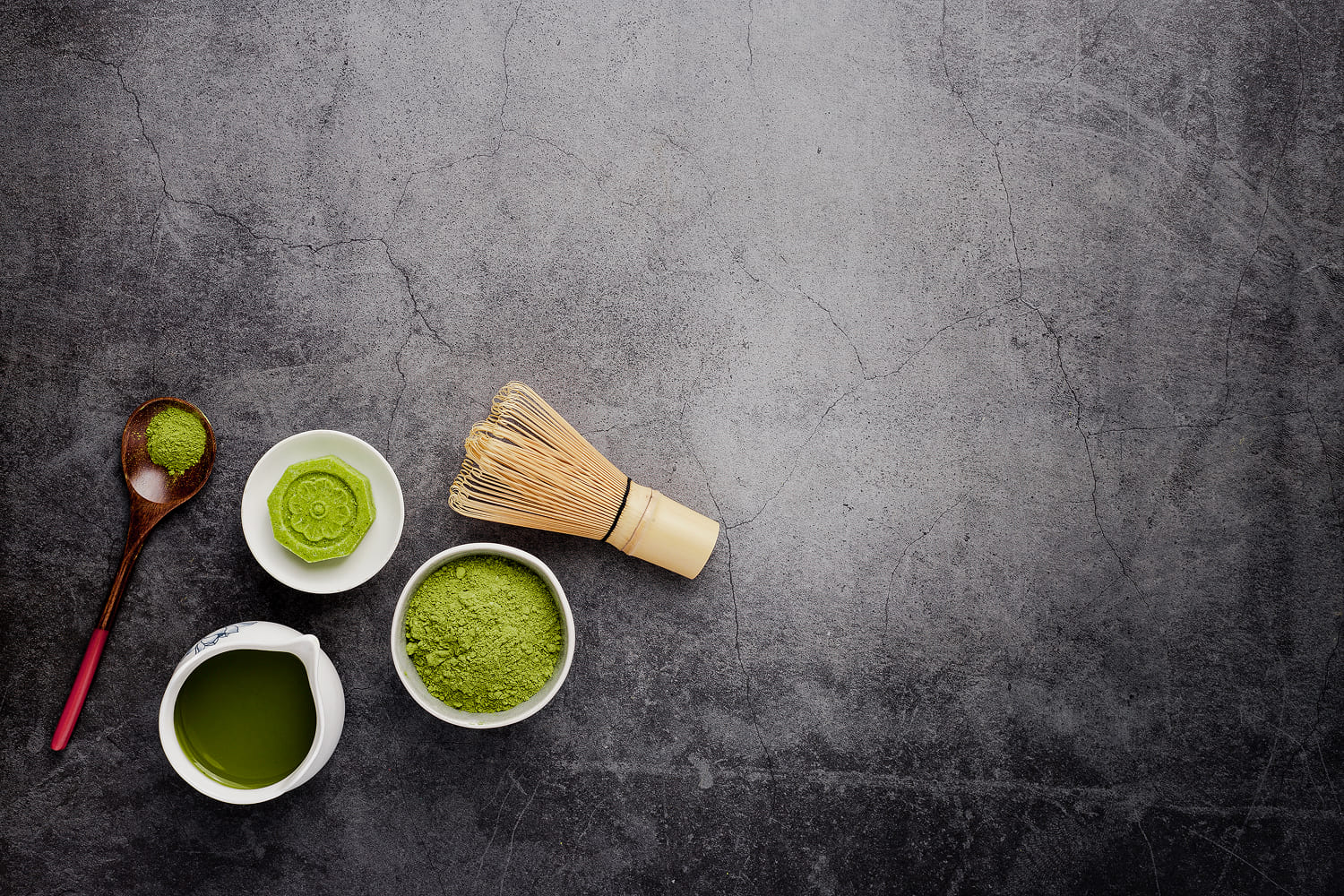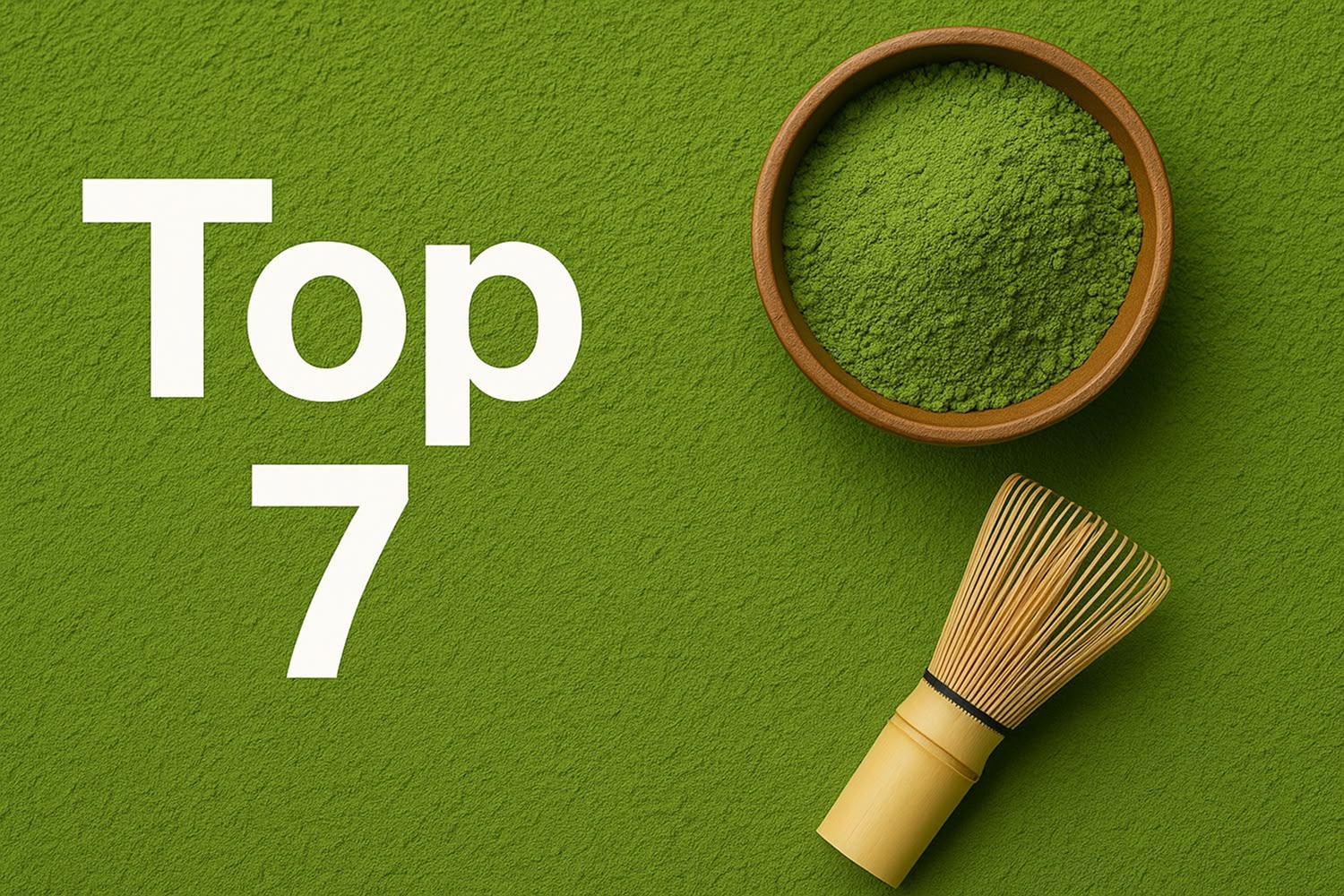Thé matcha : c’est quoi exactement et pourquoi tout le monde en parle ?


Impossible to miss. Matcha tea is everywhere — in trendy cafés, wellness Instagram accounts, smoothie recipes, and even skincare.
But what is matcha tea, really? Why has it sparked so much enthusiasm in recent years?
Is it truly a miracle drink? Or just a nicely marketed green powder?
In this article, we’ll tell you everything you need to know about matcha — no exaggeration, no fluff.
Origin, benefits, uses, precautions, purchase… Here is the complete guide for the curious (and future fans).
What exactly is matcha tea? 🌿
Matcha tea is a very fine powder of Japanese green tea, made from tencha leaves ground on stone mills.
Unlike regular tea that is brewed then removed, here the entire leaf is ingested, making it a beverage much more concentrated in active compounds.
What makes matcha unique:
- The leaves are grown in the shade for 3 weeks before harvest (which increases their chlorophyll and L-theanine content)
- They are hand-picked, sorted, then slowly ground on stone mills
- The resulting powder is intense, green, and ultra-fine: it is not steeped, but whisked into hot water
📍 Originating from Japan, matcha is at the heart of the traditional tea ceremony (chanoyu).
Today, it attracts both wellness enthusiasts and foodies alike.
Why is everyone talking about matcha? The highlighted benefits 💚
Matcha’s success doesn’t just come from its “healthy” image.
It’s also one of the teas richest in nutrients, with proven and felt effects.
1. Stable, smooth energy
Matcha contains caffeine (about 30–40 mg/g) as well as L-theanine, an amino acid that slows caffeine absorption.
The result: mental stimulation without jitters, longer-lasting than coffee.
2. Focus and mental clarity
The caffeine + L-theanine combo improves focus without restlessness, making it a go-to drink for students, creatives, or remote workers.
3. Powerful antioxidants
Matcha is very rich in catechins, especially EGCG (epigallocatechin gallate), known for its antioxidant properties.
One study showed it contains up to 137 times more antioxidants than infused green tea 【source: PubMed】.
4. Detoxifying effect
Thanks to its high chlorophyll content, it promotes the elimination of toxins and heavy metals.
How to consume matcha? Uses and dosage ☕
Ways to consume it:
- Traditional (usucha): 1 to 2 g of matcha + 60–80 ml of water at 70–80°C, whisked with a chasen (bamboo whisk)
- Matcha latte: with plant-based milk (oat, almond…) and a splash of maple syrup
- In cooking: smoothies, bowls, pastries, sauces
Recommended dosage:
- 1 to 2 g per day is enough to enjoy its benefits
- Best consumed in the morning or before a mental/physical activity
- Avoid in the evening due to the caffeine
🎯 Tip: Start with 1 g/day if you are sensitive to caffeine, then adjust based on how you feel.
Are there any side effects or precautions to know? ⚠️
Although natural, matcha remains an active substance.
Here are a few things to watch out for:
- Caffeine: be cautious if you’re sensitive or prone to insomnia
- Pregnancy and breastfeeding: matcha is allowed in small amounts (max 1 g/day), but medical advice is recommended
- Possible interactions: matcha may interact with certain treatments (anticoagulants, blood pressure medication)
⚠️ Lastly, be careful with product quality: some low-grade matchas may contain pesticides or heavy metals.
Always choose organic matcha from Japan, ideally with supporting lab analyses.
Which matcha to choose for a good experience?
Not all matchas are equal.
To fully enjoy its effects (and taste), here’s what to look for:
Quality criteria:
✅ Certified Japanese origin (Uji, Nishio, Kagoshima)
✅ Ceremonial or premium grade
✅ Organic certification
✅ Bright green color (not dull or yellowish)
✅ Recent harvest date
✅ Lab analysis available
💡 We recommend checking out our 2025 best matcha brand comparison to avoid unpleasant surprises.
FAQ – Matcha Tea: Most Common Questions
Is matcha better than coffee?
Not necessarily “better,” but different. It provides energy without spikes or crashes and contains added antioxidants.
Does matcha help with weight loss?
Not directly. It supports metabolism, but doesn’t replace exercise or a balanced diet.
Can you drink it every day?
Yes, at a dose of 1 to 2 g per day, unless medically contraindicated.
Do all matchas taste the same?
No! A good matcha is smooth, round, slightly umami. A bitter or harsh matcha is often low quality.
Should you drink it on an empty stomach?
You can, but some people prefer to have it after breakfast to avoid an empty-stomach sensation.
In summary: Matcha tea, a true gem when well chosen ✅
Now that you know what matcha tea is, where it comes from, how it works, and why it’s so popular,
you can enjoy it with full awareness.
It’s a drink that is both gentle and powerful, easily fitting into a wellness routine — provided you choose a quality powder and follow a few simple rules.
👉 Want to try a good matcha to start with?

Japanese Green Tea Co
Prix à partir de :
14,00$
Use code LMC to enjoy 10% off premium, authentic Japanese matcha. Discover the perfect balance of quality and tradition with every cup.

Découvrez le top 7 des meilleurs Matcha en poudre
Notre sélection exclusive des Shilajits himalayens les plus purs et efficaces, testés et approuvés par nos experts.
